Commission OKs FY 2013 Parks Budget
Ann Arbor park advisory commission meeting (April 17, 2012): The action items at this month’s PAC meeting focused on the upcoming fiscal year, with parks-related budget recommendations for July 1, 2012 through June 30, 2013. Sam Offen, who chairs PAC’s budget and finance committee, observed that the FY 2013 budget is in better shape than in recent years.
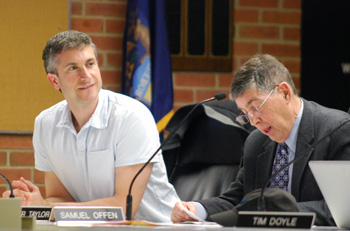
At left is city councilmember Christopher Taylor (Ward 3), who also serves as an ex officio member of the Ann Arbor park advisory commission. To the right is Sam Offen, chair of PAC's budget and finance committee. (Photos by the writer.)
This is the second year of a two-year budget cycle, and commissioners had recommended approval of budgets for both years at their April 2011 meeting. The recent recommendations for FY 2013 include: (1) increasing the frequency of the mowing cycle from every 19 days to every 14 days; (2) increasing seasonal staffing between April 15–October 15 to maintain active recreation areas better; (3) establishing three seasonal park steward/supervisor positions to improve park maintenance and enforcement; and (4) increasing seasonal staffing at the ice arenas to improve facility cleanliness.
Fee increases at several parks and rec facilities are also part of the budget recommendations, but most have already been implemented in the current fiscal year.
The April 17 meeting included a public hearing on the renewal of the city’s park maintenance and capital improvements millage, which will likely be on the November 2012 ballot. No one spoke at the hearing. In general, “there seems to be a great deal of relative silence” about the millage, parks and rec manager Colin Smith told commissioners. Few people have attended the recent public forums held by parks staff. The final forum is set for Thursday, April 26 from 6:30-7:30 p.m. at the Ann Arbor District Library’s Traverwood branch, 3333 Traverwood Drive.
Parks staff gave an update on deteriorating conditions at Windemere Park’s two tennis courts, and provided an initial estimate on costs to replace one or both courts at that location. No formal recommendation has been made, but options include moving the courts to another park. Commissioners discussed the need to assess the distribution and conditions of all of the city’s public courts – including ones in the public school system – as well as their overall usage, to get a better idea of where the greatest needs are.
Another update came from an engineer at the Washtenaw County water resources commissioner’s office, who described a drain replacement project that will affect Veterans Memorial Park later this year. Also related to Veterans Memorial, the request for proposals (RFP) for a skatepark there has been issued. [.pdf of skatepark RFP] The goal is to solicit proposals for a consultant to handle design and oversee construction of the skatepark, which will be located on city-owned property.
During public commentary, commissioners were given an update on the nonprofit Project Grow, which has several gardens located in city parks and is celebrating its 40th anniversary this year. Another speaker urged commissioners to take control of the parking lots in city parks, and possibly increase revenues by installing metered parking.
Parks & Rec Budget Recommendation
Park commissioners considered two resolutions related to the city’s fiscal year 2013 budget, for the year beginning July 1, 2012 through June 30, 2013. It’s the second year of a two-year budget planning cycle. PAC had previously recommended approval of budgets for both years at its April 2011 meeting. The parks budget is part of the city’s overall budget, which city administrator Steve Powers proposed at the April 16 meeting of the Ann Arbor city council.
Most of these changes have already been implemented, as part of the current year’s budget. Colin Smith, the city’s parks and rec manager, reminded commissioners that there will be no increase in budgeted expenses. These changes will be made within the budget plan that was discussed last year for FY 2013, when the FY 2012 budget was formally adopted. [.pdf of budget resolution adopted by council for FY 2012, including parks-related items]
The portion of the city budget relating to parks is separated into two parts: (1) park operations; and (2) parks and recreation.
Sam Offen, who chairs PAC’s budget and finance committee, noted that the budget is in better shape than in recent years. He joked that it makes his job much easier.
Parks & Rec Budget Recommendation: Parks Operations Budget
PAC was asked to approve recommendations for the FY 2013 parks operations budget, which includes the following proposed changes: (1) increasing the frequency of the mowing cycle from every 19 days to every 14 days; (2) increasing seasonal staffing between April 15–October 15 to maintain active recreation areas better; (3) establishing three seasonal park steward/supervisor positions to improve park maintenance and enforcement; and (4) increasing seasonal staffing at the ice arenas to improve facility cleanliness. [.pdf of parks operations budget recommendation]
There was considerable discussion about whether to change the wording on the recommendation for the mowing cycle. Tim Doyle initially felt it sounded too much like a dictate rather than an objective, and preferred deferring to staff’s judgement on the exact number of days in the cycle. After some wordsmithing on a possible amendment, Christopher Taylor – PAC’s ex officio member who also serves on city council – was asked whether his council colleagues would understand the intent. “Contextually, it’s plain enough,” he said.
Ultimately, PAC reached a consensus not to change wording on the recommendation.
Outcome: Commissioners voted unanimously to recommend approval of the FY 2013 parks operations budget.
Parks & Rec Budget Recommendation: Parks & Rec Budget
In a separate resolution, PAC was asked to recommend approval of the FY 2013 parks and recreation budget. The resolution commended parks staff for its work, and made several general recommendations: (1) reduce energy expenses to reflect the benefit of infrastructure energy improvements at recreational facilities, including Cobblestone Farm and Mack Pool; (2) reduce materials and supplies used to maintain various facilities as a result of recent improvements; (3) reduce water usage expense to reflect actual usage better; (4) eliminate unnecessary software installations where appropriate; (5) increase revenue by initiating additional programming at the Argo Cascades; and (6) increase revenue by increasing fees for admission to swimming pools. [.pdf of parks & rec budget recommendation] [.pdf of fee increases]
Most of these items have been started in the current fiscal year, Offen noted, and will continue into FY 2013.
Outcome: Commissioners unanimously recommended approval of the FY 2013 parks and recreation budget.
Parks Millage Renewal: Public Hearing
No one spoke during a public hearing on the renewal of the city’s park maintenance and capital improvements millage, which will likely be on the November ballot.
Park commissioners had been briefed by staff about the millage renewal at PAC’s March 20, 2012 meeting.
John Lawter, PAC’s vice chair who was presiding over the meeting in the absence of chair Julie Grand, noted that two of the four public informational forums regarding the millage had been held. [The third forum took place on Monday, April 23. The final one is set for Thursday, April 26 from 6:30-7:30 p.m. at the Ann Arbor District Library's Traverwood branch, 3333 Traverwood Drive.]
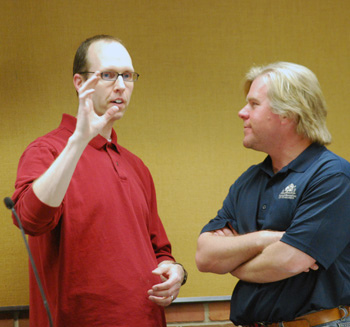
From left: Greg McDonald, assistant manager of city operations for Community Television Network (CTN), explains a camera problem to Colin Smith, the city's parks and recreation manager. The controller that allows CTN staff technicians to remotely control cameras in city council chambers wasn't working during the April 17 park advisory commission meeting. CTN staff instead adjusted the cameras manually prior to the meeting, to capture wide angle views of the proceedings.
Colin Smith, parks and rec manager, noted that Grand had wanted to schedule some of the public forums prior to the public hearing at PAC, and prior to a vote by PAC on whether to recommend millage renewal. That way, PAC could respond if any issues arose. However, Smith added, ”there seems to be a great deal of relative silence,” and nothing has come up to indicate that the city is on the wrong track in seeking renewal. [At an April 11 forum held at Cobblestone Farm, several city parks staff, PAC commissioners, city councilmember Jane Lumm, and two members of the media – from The Chronicle and WEMU – showed up. But only one member of the public came: Eric Meves, a board member at Project Grow who also spoke during public commentary at the April 17 PAC meeting (see below).]
Gwen Nystuen observed that it’s hard to get people excited now about a vote that won’t happen until November. She said she hadn’t heard anything unfavorable about the millage, and that people in Ann Arbor are very supportive of parks. “I’m optimistic,” she said.
Sam Offen asked whether there were any significant comments or feedback from the first two forums. Lawter reported that the one person at the forum he attended was supportive. [That person was Meves.] Nystuen praised the staff – she said they had done a good job of answering questions at the first forum about how the budget was prepared.
Informational handouts are being distributed, and Smith pointed out that information about the millage renewal is also available on the city’s website.
Windemere Park Tennis Courts
Parks planner Amy Kuras gave a presentation on the tennis courts at Windemere Park, a nearly four-acre parcel on the city’s northeast side, north of Glazier Way between Green and Earhart roads. There was no action requested of PAC at this meeting – the staff just wanted to update commissioners on the situation.
The courts were initially built in 1986, then color coated in 2007. Repairs to cracks in the court were attempted in 2009, Kuras said, but failed because of poor soil conditions. The city also attempted to install new net posts in 2009, but that also failed.
In 2010, the city took soil borings in five parts of the park. The borings revealed saturated organic soil and fill, particularly in areas located near the tennis courts in the west part of the park.
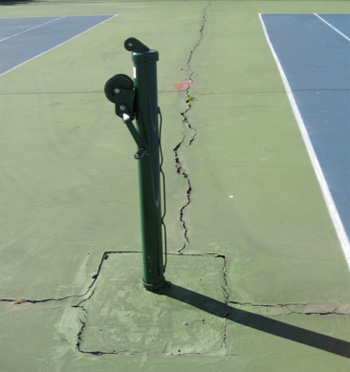
Cracked pavement at the Windemere Park tennis court. (Image provided by city staff in a slide presentation to PAC.)
Part of the problem is a high water table, Kuras said. In fact, the parks staff have noted higher water tables throughout the city, she added. The only hard data that the city has collected on the water table is at the municipal airport, and there the water table measures between 2-7 feet below the surface now, compared to 15 feet below the surface 50 years ago. Jen Lawson, the city’s water quality manager, attributed the change to a variety of factors, Kuras reported, including climate change and more impervious surfaces in the city.
Kuras presented a chart showing cost estimates to replace either one or both courts at the current location. She based her estimates on work done for tennis courts at Veterans Memorial Park and West Park. The total would be $181,377 for two courts at Windemere, or $107,408 for one court. [Link to chart of itemized replacement costs.]
The options to consider, Kuras said, include: (1) replacing both tennis courts at the current location, (2) replacing the courts in another part of Windemere Park, (3) replacing only one court, (4) removing the courts, or (5) possibly putting the courts in another park.
Matt Warba, the city’s acting field operations manager, told commissioners that he’s frustrated by the situation. The staff has attempted several repairs, but with water at just two feet below the surface, it’s difficult. There’s a likelihood that having tennis courts at that location isn’t reasonable, he said. But he understands the value to the neighborhood, and the staff is still working on getting some firm numbers and options to consider. There’s no easy or quick solution, he said, but they’re working on it.
Windemere Park Tennis Courts: Public Commentary
Jeff Alson told commissioners that he has lived near the park since the late 1970s. He bought his home there in part because of the park. There are a lot of tennis players in the neighborhood, and there are a lot of young children in the area so demand could grow. But because of water issues there’s only one court that can be used. Last summer, he hardly played there at all. Alson said he understood that there are problems with water that make maintenance of the courts more expensive. But he emphasized that the courts have held up well for at least the last 10 years, and he would consider it a good investment. It would be disappointing to him if the courts were removed. Alson concluded by thanking commissioners for their service to the city.
Windemere Park Tennis Courts: Commission Discussion
David Barrett asked whether the water table is the same throughout the park. Yes, Kuras said, but the soil composition is different at certain locations in the park – that’s a factor, too. She clarified that there are water table issues at other parks, but nothing to the degree they’re seeing at Windemere.
Barrett recalled that when the city decided to put in rain gardens at Burns Park, they were slow to let the community know about it. He wondered what kind of outreach was happening for the tennis courts at Windemere. Colin Smith, parks and recreation manager, indicated that outreach would occur when the staff had more information to share. If it makes sense to move the tennis courts, the neighborhood would need to be engaged, he said.
Tim Doyle asked is there’s evidence of this same kind of problem at other city tennis courts. He said he’s encountered it on a similar project he’s working on near Honey Creek, on the west side of town. Warba said that certainly there are areas in the parks that are wetter than they’ve been in the past. But the Windemere courts are the worst by far.
Sam Offen noted that there are a lot of city tennis courts on the west side of town, but he wondered how many there were on the northeast side. Kuras reported that there are three courts in Leslie Park and two in Sugarbush Park, and it might be possible to accommodate new tennis courts somewhere in Foxfire North Park. All of those parks are in northeast Ann Arbor.
Jeff Alston, a resident who’d spoken during public commentary, pointed out that the courts at Sugarbush are too short for adults to play – they hit the back fence with their rackets, he said.
Gwen Nystuen said she didn’t know too much about tennis courts, but that it seemed like the city should assess the distribution and conditions of all of its courts, as well as their overall usage, to get a better idea of where the greatest needs are.
Commissioners and staff also discussed the availability of tennis courts at Ann Arbor public schools, noting that certain times of day and certain days of the week those courts are heavily used by students. Tim Berla noted that Ann Arbor Rec & Ed runs tennis leagues, as does the Ann Arbor Area Community Tennis Association. He pointed out that court conditions aren’t just a concern for the city parks – a sinkhole developed at the relatively new tennis courts at Skyline High School, putting one of the courts out of commission. Berla suggested looking at other materials, such as clay, which he said required more maintenance but wouldn’t crack.
Assuming there’s need for more tennis courts on the northeast side of town, Berla wondered whether the former Pfizer property – now owned by the University of Michigan – could be a possible location for new courts. He noted that there’s a lot of unused land there, as well as available parking.
Drain Project at Veterans Memorial Park
Scott Miller, an engineer with the Washtenaw County water resources commissioner’s office, was on hand to give a presentation about a drain project that would affect Veterans Memorial Park. He said the county had been petitioned by the city to do this project. It’s referred to as the West Park Fairgrounds project, which is the name of the drain that runs through that section of town – on the west side of town, in the former fairgrounds area. Miller acknowledged that it was a bit confusing, given that a park in a different location is called West Park.
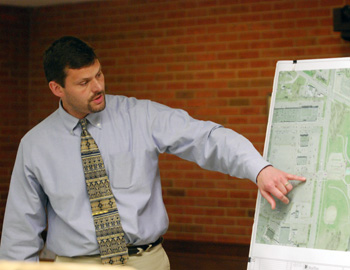
Scott Miller of the Washtenaw County water resources commissioner's office describes an upcoming drain project that will affect Veterans Memorial Park.
The upper end of the drain is located in the Maple Village Shopping Center, where Kmart and Plum Market are located. The drain starts out as a 30-inch pipe and quickly transitions to a 54-inch pipe and then a 66-inch corregated metal pipe as it runs toward town. The pipe runs through Veterans Memorial Park, crosses under Dexter Road and heads east, eventually connecting to a pipe that contains another branch of the Allen Creek.
The city conducted video inspection of the pipe and found several sections that are cracked and corroded, resulting in leaks. Portions of the pipe were clogged with debris. [The city council voted at its Sept. 20, 2010 meeting to petition the county water resources commissioner for this project, estimated to cost roughly $2 million. It will be repaid by the city in annual installments over 15 years.]
Miller said the county staff began work last fall, first clearing the debris and then conducting another video assessment. That revealed two sections of the pipe that have a significant sag, and result in water being held in those sections year-round. One sagging section is in the parking area in the shopping center. Another is in the north side of the park’s parking lot that’s accessed off of Dexter Road. The preliminary design is to dig up the two sections of sagging pipe and replace them. For the rest of the pipe, the plan calls for putting in a cast lining to reinforce the pipe structurally.
The project would cause minimal disruption, he said, but would include some impact to the parking lot and a small portion of the area west of one of the ballfields. The county is coordinating with the city, which is doing road work and water main replacement along Dexter Road, as well as upcoming work to renovate the ballfields in the park.
The project is in the design phase now, Miller said, with construction expected to begin in the fall.
Drain Project at Veterans Memorial Park: Commission Discussion
Gwen Nystuen asked for more details about how much land would be dug up for the project. Miller reported that in the Maple Village lot, a section about 15 feet wide and 150 feet long would be excavated. In Veterans Memorial Park, the work would be about 15 feet wide and 190 feet long.
Nystuen also commented on the confusing name of the project, and Miller agreed: “It’s raised confusion at a lot of levels,” he said, but they don’t have much latitude to change it.
David Barrett pointed out that there’s already disruption to the park – a big pile of dirt has been dumped by the ballfield. He wondered if the county had also coordinated with Ann Arbor Rec & Ed, which runs softball leagues in the park. Miller said the drain work hasn’t yet started, so the excavated dirt isn’t from their project. Matt Warba, the city’s acting field operations manager, clarified that it was likely related to road construction there. Parks and rec manager Colin Smith said the parks staff has been coordinating with Rec & Ed since last year regarding work in the park.
Sam Offen asked about the project’s timeframe. It will likely take about two months, Miller replied, but more if there’s a lot of rain. In response to another query from Offen, Miller said the county is mindful of the potential flooding impact downstream, but noted that this project isn’t intended to increase capacity dramatically. There will be more efficient flow, however.
Tim Berla clarified that Rec & Ed has cancelled its fall season, which starts in August, because of renovation work on the ballfields at three parks, including Veterans. [PAC had recommended those renovations at their February 2012 meeting.] He asked whether it would be possible to do the park portion of the drain project first, to ensure it would be finished by the spring season. Miller said it probably wouldn’t matter – the entire project is expected to be done by the spring of 2013 – but he would look into it.
Berla also asked whether the proposed skatepark – to be located in another part of Veterans Memorial Park – would affect the drain project, in terms of adding runoff. Miller said that although the addition of any impervious surfaces would affect runoff, the pipe is underutilized and has the capacity to handle it.
Smith noted that one of the elements of the skatepark design, as reflected in the request for proposals, will be to include stormwater management that meets or exceeds city standards.
Communications & Commentary
Every meeting includes opportunities for public commentary and communications from commissioners and staff.
Comm/Comm: Public Commentary – Parking in Parks
During public commentary, George Gaston told commissioners that he recently visited the University of Michigan’s Matthaei Botanical Gardens – it’s a lovely place, he said. He had noticed that UM now has metered parking there at $1.20 per hour, between 8 a.m. and 8 p.m. Gaston noted that the city leases its Fuller Park parking lot to UM. It was supposed to be a temporary arrangement, but it’s been going on for about 20 years. He wondered if the city has considered taking back control of that lot and and making it a metered lot, too. UM hospital employees use it 24/7, Gaston said, but only pay for part of that time. It could be a great revenue source for the city.
Gaston noted that people park their vehicles all day at Island Park and West Park, as two examples. And with UM planning to build a parking structure on Wall Street that would add another 500 spaces to that area, it might be possible to forego leasing the 18 spaces at Riverside Park to UM and adding metered spaces instead. “You might gain real money out of this,” Gaston said. There’s precedent in the city for 24-hour metered lots – at the Amtrak station on Depot Street, for example. Right now, it seems the city is undercharging the university for parking. With meters, the lots would be available to anyone if they paid. It might make sense to look into this, he concluded.
Comm/Comm: Project Grow – Public Commentary
Eric Meves, a board member of Project Grow, gave commissioners an overview of the nonprofit. He started by referring to Gaston’s comments about parking, noting that Project Grow had to buy parking tags at Matthaei for its gardeners there this year. Meves told commissioners that Project Grow is celebrating its 40th anniversary this year, and he’s gardened with the group for 39 of those years.
Several Project Grow gardens are in city parks, so he wanted PAC to become familiar with the organization. It’s an educational organization, with assistance for low-income residents. Although the nonprofit has received city funding in the past, it no longer receives public money, he noted.
Project Grow doesn’t own any land. About a third of the gardens are located in Washtenaw County parks, and a third on Ann Arbor public school property. The remaining third is evenly divided between UM land, private property, and city of Ann Arbor parks. About 300-350 families have garden plots each year, Meves said. People do it to grow food, but also for outdoor exercise and to be in a pleasant environment, he said. There’s also an element of community – being with your fellow gardeners.
The nonprofit grosses about $40,000 to $50,000 annually, Meves said. About 60% of that comes from plot fees – it costs about $130 for a full plot. About 20% of revenues come from fundraising, primarily through an annual plant sale. The remaining 20% comes from an organic gardening class that Project Grow developed for Washtenaw Community College.
Roughly half of those revenues allow Project Grow to have one half-time employee who works out of his house, Meves said. The group relies on volunteers and a working board. The rest of the funds are used to pay for things like water, utilities, insurance and capital improvements. There are about 40 people on a waiting list for gardens now – demand for gardens is about two to three times what Project Grow can provide, he said.
Meves unfurled a map that he said was made with the help of Merle Johnson and Dan Rainey of the city’s information technology department. It showed possible additional locations for gardens within the parks system.
Comm/Comm: Project Grow – Manager’s Report
Later in the meeting, Colin Smith reported that parks planner Amy Kuras has been working with the Project Grow managing director [Kirk Jones] to draft an agreement that will outline the formal relationship between the city and the nonprofit. It’s been a few years since the city funded Project Grow, he said, but because the group uses city parkland, there’s still a relationship. The agreement will stipulate what the procedures are for putting gardens into parks. There have been varied reactions to having gardens in the parks, depending on the neighborhood, he noted. Parks staff will share the agreement with PAC when it’s ready, he said.
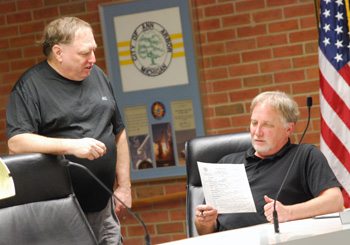
From left: Park advisory commissioners Tim Berla and John Lawter. Lawter, who chaired the April 17 meeting in the absence of chair Julie Grand, was reviewing procedural rules with Berla before the meeting. Berla's advice: "No one ever did time" for flubbing Robert's Rules.
Tim Berla asked if there’s anything PAC or the city can do to help Project Grow identify potential locations for more gardens. Kuras said she works with the organization – sometimes she’ll be contacted by someone in a neighborhood who’s interested, and she’ll in turn contact Project Grow, or sometimes Project Grow comes to her. There are certain requirements, she noted. The land needs to be in a sunny area, and have access to a water source. The city also needs to hold a public meeting if a park is being considered for gardens, and sometimes neighbors don’t want it, she said.
Smith noted that the agreement with Project Grow will include details about how PAC can be involved in the process of selecting new locations.
Gwen Nystuen said she appreciated that Eric Meves had spoken to PAC during public commentary. She hadn’t realized how many people are involved, and how the city provides relatively little land for the group. It’s useful information, she said, especially given the growing interest in the local food movement.
Tim Doyle clarified with Smith that there is no relationship between Project Grow and the city’s greenbelt program.
Comm/Comm: Skatepark RFP
Smith reported that the request for proposals (RFP) for a skatepark at Veterans Memorial Park would be issued the following day. [.pdf of skatepark RFP] The goal is to solicit proposals for a consultant to handle design and oversee construction of the skatepark, which will be located on city-owned property.
Tim Doyle asked how the project would be funded. Smith replied that there are three sources for the roughly $1 million cost of the project: (1) private donations – primarily solicited through the Friends of the Ann Arbor Skatepark; (2) a $300,000 state grant; and (3) up to $400,000 in matching funds from the Washtenaw County parks and recreation commission. The Ann Arbor Area Community Foundation is acting as fiduciary for the project.
The city’s contribution will be the land and staff time to manage the process, Smith said, not money. It will be a city-owned asset, he said.
In terms of process, a selection committee – which will include members of the Friends of the Ann Arbor Skatepark, as well as city and county representatives – will be relied on to make a recommendation for the designer. That recommendation will be reviewed by PAC. PAC commissioner David Barrett will serve on the committee. Park planner Amy Kuras is the city’s point person on the project.
Construction is expected to start in the spring of 2013.
Gwen Nystuen asked about the relocation of pathways that will be required because of the skatepark location. Kuras noted that some pathways in Veterans Memorial Park are being redone as part of the Dexter Avenue improvement project that’s currently underway. Paths that connect to the skatepark will be designed as part of the overall skatepark design, she said.
Comm/Comm: Manager’s Report – Market Manager
Smith reported that the field had been narrowed to two candidates to replace Molly Notarianni, who left the job of public market manager earlier this year. He said he hoped to have finalized a hire by PAC’s May 15 meeting.
Comm/Comm: Manager’s Report – Argo Cascades
The same day as the PAC meeting, the consultant who designed the new canoe/kayak bypass by Argo Dam – Gary Lacy of Boulder, Colo. – was testing the series of drop pools along with city staff. Smith said he had hoped that Lacy would have the time to give an update to PAC about the new Argo Cascades, but the morning had been chilly and Lacy had gotten a late start on the testing, so he wasn’t able to attend the meeting.
A grand opening of the Argo Cascades is planned for June, but it will be open to the public before that. May 5 is the date for the first trips from the Argo Pond livery to Gallup Park, Smith said.
Present: David Barrett, Tim Berla, Doug Chapman, Tim Doyle, John Lawter, Karen Levin, Gwen Nystuen, Sam Offen, councilmember Christopher Taylor (ex-officio). Also Colin Smith, city parks and recreation manager.
Absent: Julie Grand, councilmember Mike Anglin (ex-officio).
Next meeting: PAC’s meeting on Tuesday, May 15, 2012 begins at 4 p.m. in the city hall second-floor council chambers, 301 E. Huron St., Ann Arbor. [confirm date]
The Chronicle survives in part through regular voluntary subscriptions to support our coverage of public bodies like the Ann Arbor park advisory commission. If you’re already supporting The Chronicle, please encourage your friends, neighbors and coworkers to do the same. Click this link for details: Subscribe to The Chronicle.




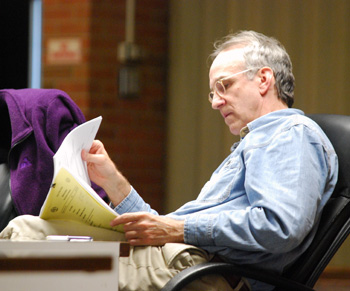
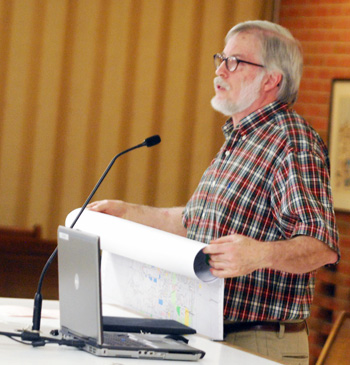
We encourage action, soon. This problem has existed for a long time without solution. Just listen to the nearby neighborhoods say the demand is there and fix a community resource. Seems like a sunk cost without adequate maintenance.
Consider a local bond issue or ~ and do something.